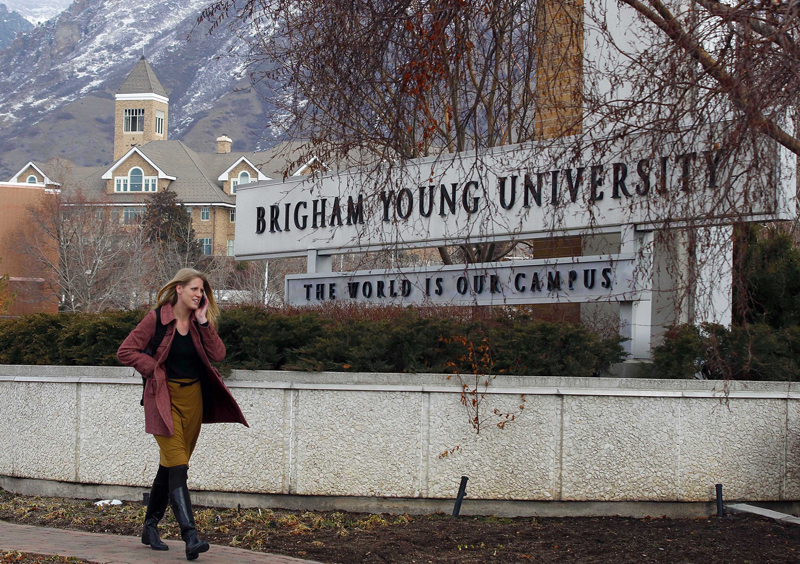There’s been some pushback this week in response to Elder Quentin Cook’s BYU devotional of February 7, when he spoke of a “banquet of consequences” for young people who engage the pleasures of the world instead of focusing on the path ahead, which should be about faith and family.
Quoting C. S. Lewis (who has, over his dead body, become the default theologian of Mormon apostles), Elder Cook said that it’s Satan’s plan to make evil seem good and wrong seem right.
In particular, he identified some major warning areas for students:
- Word of Wisdom. Elder Cook suggested that a few generations ago, forces of evil convinced people that smoking was fashionable, but time and science have proven otherwise. And alcohol addiction is responsible for broken families, hospital admissions, fetal alcohol syndrome, and more.
- Family choices. This was a major focus of the speech, which censured delayed marriage, abortion, and today’s declining fertility rates in many nations.
- Materialism. Too many people, Elder Cook said, focus on acquiring wealth, to the neglect of the spirit. It’s good to have sufficient for our needs—and then to stop there so we have time to take care of more important things.
Here’s the thing: I agree with many things that he said (more on that in a moment). But I strongly disagree with the hackneyed and counterproductive trope of casting all social change we don’t like as driven by Satanic influence. Maybe that’s because I’m doing exactly what he warned against — not being sensitive to the subtlety of evil — but I hope you’ll hear me out.
Elder Cook essentially said that people who engage in the behaviors listed above are “mercenaries” of Satan. Really? For starters, using that language where addiction is concerned ignores much of the best research on addiction, which is not only (or even always) a choice but also a disease.
But more to the point of helping this particular audience, why employ scare tactics at BYU? As he acknowledged in the speech, those students have already signed an honor code that prohibits them from smoking and drinking, so why trot out these extreme and dramatic examples of substance abuse?
Now that we are analyzing the results of the Next Mormons survey, I think I have an inkling: not all young Mormons are interpreting the Word of Wisdom as rigidly as Mormons of Elder Cook’s generation. I’ll write more about these findings in the months to come, but what I suspect is happening is that the leaders of the Church have access to the same kinds of data I am seeing, and probably far more. (The Church has its own internal research division, which does very sophisticated social science research about members.)
The problem is that Mormon leaders seem to almost immediately jump to the language of addiction whenever speaking about behaviors they want to denounce, whether that be pornography or, as here, failure to keep the Word of Wisdom. And in this case, Elder Cook has thrown in the anti-imprimatur of Satan to drive the point home.
The Church needs to do better than this. We can’t leap to the specter of fatal car crashes every time a young person asks the perfectly legitimate question of why one can of beer is wrong (especially since the Word of Wisdom itself encourages moderation). Elder Cook’s talk does nothing to answer that question, and everything to alienate any young listeners who may have in fact partaken.
I’m not saying that some of Elder Cook’s advice isn’t good. What particularly hits home for me is his discussion of the perils of delaying childbearing. I wish I could go back in time and follow that counsel. We had a child at 29, then decided to wait until my husband was finished with his doctorate and we had good health insurance before we tried again. By the time we did we were faced with infertility, miscarriage, and heartache. It’s the greatest regret of my life.
But it’s categorically unfair to say that we postponed having another child because we were bowing to the whims of Satan. That’s absurd and incredibly insulting. If anything, we thought we were being responsible adults. Responsible adults wait until they have health insurance. Were we evil to wait? I don’t think so. Naïve, certainly: we felt healthy and invincible, so it never occurred to us that my ovaries were quietly diving off a cliff.
But naiveté and ignorance are hardly a sin. Our decision to delay having another child was not the work of Satan so much as the logical result of inexperience, overconfidence, and a broken health care system.
When Mormon leaders lecture young people (or anyone else), it would be great if they could so without suggesting that anyone who has ever strayed from their carefully delineated path is under the influence of Satan. It’s just not helpful. It shuts down discussion and makes young adults feel judged. Heck, they feel judged because they are being judged. And as I shared here recently, feeling “judged or misunderstood” tied for #1 in our research in the reasons why Millennials leave the Church.
In fact, while we’re at it, maybe all of us should stop invoking Satan to describe the behavior of anyone except ourselves.
Related Posts:
Do Mormons leave the Church because they ‘got offended’?
Are Mormons in their 20s and 30s leaving the LDS Church?






